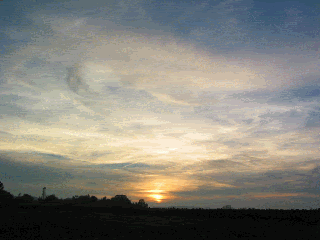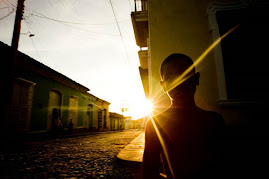 As a former asthmatic (got off that diary kid)I can attest to the effect of bad air. I've been to LA and smog ain't no joke. I mean, I can hardly be around a smoker without being peeved. Now add to that the effects of a megacity pumping out pollution. What's interesting to me is that China is showing that they have the ability to turn on and off pollution. If anything lets take note of this. Get on your cities (yeah, we know it is hard in the center of oil baron land) on lowering those emissions. Once you take a trip on the ocean (as your's truly has) you gain a greater appreciation for clean air. And if your ass is just one of those lazy people..do it for the children sap sucka.
As a former asthmatic (got off that diary kid)I can attest to the effect of bad air. I've been to LA and smog ain't no joke. I mean, I can hardly be around a smoker without being peeved. Now add to that the effects of a megacity pumping out pollution. What's interesting to me is that China is showing that they have the ability to turn on and off pollution. If anything lets take note of this. Get on your cities (yeah, we know it is hard in the center of oil baron land) on lowering those emissions. Once you take a trip on the ocean (as your's truly has) you gain a greater appreciation for clean air. And if your ass is just one of those lazy people..do it for the children sap sucka.
Pollution curbs turn Beijing into urban laboratory
By TINI TRAN, Associated Press Writer Sun Aug 3, 2:20 PM ET
BEIJING - Like everything else done for the Olympics, China's quest to clear up notoriously polluted skies in time for opening ceremonies this week has been marked by gargantuan effort.
In what scientists are calling the single largest attempt ever made to improve air quality, scores of heavily polluting factories were shut down and some 2 million vehicles were pulled off roads across Beijing and a huge swath of northern China — an area roughly the size of Alaska. During the weekend, the hazy skies finally gave way to swirling blue.
Beijing's massive experiment with controlling pollution is offering international researchers a one-of-a-kind chance to study the large-scale effort in a uniquely urban laboratory.
"It has never been done before. I doubt it will be repeated. This is it. We've got a golden opportunity to fast-forward our research," said Veerabhadran Ramanathan, an atmospheric scientist from the University of California, San Diego, who is part of a multinational research project to track Beijing's pollution during and after the Olympics using unmanned drones, satellite data and ground-level readings.
He is one of dozens of scientists from around the world who are gathering in and around China to conduct experiments ranging from monitoring how pollution travels across continents to sampling particulate pollution over time to testing the impact of dirty air on cardiovascular functions.
Ramanathan said he first learned about China's plans to restrict cars and shut down factories last year from reading a newspaper article. As a scientist who studies pollution clouds over Asia, known as atmospheric brown clouds, he was thrilled to hear that China planned to cut back on pollution in a major way; in essence, conducting large-scale experiments he could observe.
"I immediately jumped off my seat. I thought, this is what I've been waiting for. I said, 'Thank God for the Olympics.' For me, this is 10 times better than winning the lottery," he said.
The Associated Press has been compiling its own pollution data since mid-July, recording snapshot readings of Beijing's worst pollutant — tiny dust particles known as particulate matter 10 — using a commercially available handheld monitoring device.
With China's polluted air ending up over Korea or landing in California, the data being collected now may have larger ramifications beyond these games. If China's efforts can be shown to have had a major impact, then other countries could consider taking similar actions.
Whether its current efforts actually result in clear skies for the Summer Games remains to be seen. Since the factory closures and traffic restrictions kicked in on July 20, Beijing's air pollution levels have gone up and down, though the general trend is decreasing.
What is increasingly clear is how much of a role meteorological conditions play in cutting down pollution.
"If Mother Nature cooperates, I expect there would be an impact. But it all depends on the wind directions," Veerabhadran said.
In the past two weeks, four days failed to meet the national air quality standard, with pollution levels classified as unhealthy for sensitive groups. On those days, the capital was cloaked in sweltering temperatures and a thick, grayish haze that reduced skyscrapers to ghostly outlines.
But strong winds and rainfall in the last week helped scatter much of the smog, giving Beijing residents a rare spate of sunshine and blue sky over the weekend. The air pollution index showed a decrease in pollutants, dropping to a level considered healthy by the World Health Organization.
The pollution levels are similar to findings that the Associated Press collected. Last Friday marked the clearest change visually, with the persistent haze giving way to clear skies and the lowest recorded air pollution levels. The AP's data showed that Beijing had lower levels of particulate matter than New York City on that day.
From a researcher's point of view, China's attempts to ensure blue skies for the Olympics are of huge scientific interest, said Staci Simonich, an associate professor of chemistry and toxicology at Oregon State University.
"It's a giant science experiment on air pollution. As far as I know, it's the biggest case where a city that had air quality problems took strong measures to improve air quality. They've taken it very seriously. It's exciting from a science standpoint," said Simonich, who is collaborating with Peking University professors to take samples of particulate matter.
Though Los Angeles and Atlanta both took measures to improve their air quality when they hosted the Olympics, neither city has had the same obstacles as the Chinese capital. "They didn't have to go to quite the extremes that Beijing has. Beijing has had to come a long way further than L.A. or Atlanta," she said.
If it can be proven that China's efforts made a major impact, then other countries may consider taking similar environmental actions, she said.
"It's not just about China. It's about megacities across the world. What's learned here can perhaps be applied to other cities," Simonich said.
Other scientists chose to focus on the health impact of the dirty air, a huge concern that was raised earlier by Olympic athletes. Several countries, including the U.S., has already said they will provide their athletes with an air mask that they have the option of using.
Qinghua Sun, an assistant professor at Ohio State University's College of Public Health, is working with two Chinese universities to collect data on the mechanics of how air pollution affects human health, especially cardiovascular diseases.
Sun, who will be conducting experiments on both mice and humans, said he is looking specifically at the impact of ultrafine particles, known as PM 2.5., on diabetic patients since preliminary data has shown that there is a clear link between cardiovascular disease and PM 2.5
"Hopefully, with our data, China can see the need to take a dramatic policy strategy to continue the good policies they conducted during the Games," he said
http://news.yahoo.com/s/ap/20080803/ap_on_sp_ol/oly_olympics_laboratory
The white European Death Cult
6 years ago














1 comment:
Peace God!
Yeah the brother lays it down.
Something that was funny, was watching my fave show "No Reservations" with Chef Anthony Bourdain, when he went to Jamaica. He met up and interviewed the brother. Bourdain is known as the "anti-vegetarian".....however Mutabaraka broke it down and explained that vegetarianism has nothing to do with the "culinary elitest movement" white people may have made it into....he prepared some food for Anthony, and, knowing that Anthony isn't a fan of vegetarian food, asked him on camera "Is it good?" To which Bourdain replied..."Yes, this is delicious!" Then the brother put him out there like..."Is it good? The truth..not for the camera!!!"...Anthonny Bourdain got shooked because Muta looked like he was about to jack him up.....LMAO...
Post a Comment